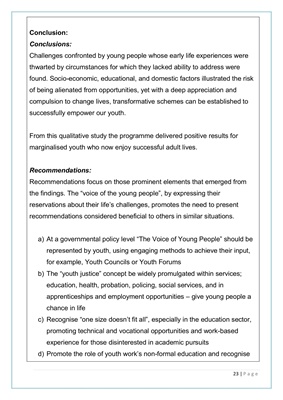
23 | P a g e
Conclusion:
Conclusions:
Challenges confronted by young people whose early life experiences were
thwarted by circumstances for which they lacked ability to address were
found. Socio-economic, educational, and domestic factors illustrated the risk
of being alienated from opportunities, yet with a deep appreciation and
compulsion to change lives, transformative schemes can be established to
successfully empower our youth.
From this qualitative study the programme delivered positive results for
marginalised youth who now enjoy successful adult lives.
Recommendations:
Recommendations focus on those prominent elements that emerged from
the findings. The "voice of the young people", by expressing their
reservations about their life's challenges, promotes the need to present
recommendations considered beneficial to others in similar situations.
a) At a governmental policy level "The Voice of Young People" should be
represented by youth, using engaging methods to achieve their input,
for example, Youth Councils or Youth Forums
b) The "youth justice" concept be widely promulgated within services;
education, health, probation, policing, social services, and in
apprenticeships and employment opportunities - give young people a
chance in life
c) Recognise "one size doesn't fit all", especially in the education sector,
promoting technical and vocational opportunities and work-based
experience for those disinterested in academic pursuits
d) Promote the role of youth work's non-formal education and recognise